| Srl | Item |
| 1 |
ID:
146595
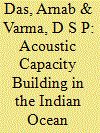

|
|
|
|
|
| Contents |
The fractured maritime mandate in India and the involvement of multiple agencies and ministries for matters maritime, make it complicated to achieve synergy. The UWR, Goa is a defence facility under the Ministry of Defence, the Ministry of Earth Science in mandated to provide R&D support for ocean related aspects, the we have the Ministry of Shipping and Ministry of Science and Technology as other players. It is known that there are close to 17 agencies and ministries of the Government of India involved in maritime issues. The huge resource and support required for UDA is possible only when all these agencies come together for a long term commitment to enhance our UDA in the IOR. A comprehensive Maritime Strategy formulation with clear focus on UDA is the only way forward to synergise the efforts of all the possible players involved. The Make in India initiative can be leveraged to contribute significantly to the Blue Economy with a clear maritime focus backed with an effective Maritime Strategy translating to enhanced Acoustic Capability in the future.
|
|
|
|
|
|
|
|
|
|
|
|
|
|
|
|
| 2 |
ID:
124167
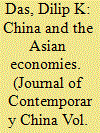

|
|
|
|
|
| Publication |
2013.
|
| Summary/Abstract |
The objective of this article is to explore the economic relationship between China and the surrounding dynamic Asian economies. It delves into China's influence over the Asian economies and whether this relationship has evolved in a market- and institution-led symbiotic manner. The three principal channels of regional integration analyzed in this article are trade, FDI and vertically integrated production networks. Another issue that this article explores is the so-called China 'threat' or 'fear' in Asia. The China threat implied that China was crowding out exports from the other Asian economies in the world market place. Also, as China became the most attractive FDI destination among developing countries, it was understood that China was receiving FDI at the expense of the Asian economies. These concerns were examined by several empirical studies and the inference was that they were exaggerated. The article concludes that China methodically expanded and deepened its economic ties with its regional neighbors. At the present juncture, China's integration with the surrounding Asian nations is deep. Both China and its dynamic Asian neighbors have benefited from this synergy.
|
|
|
|
|
|
|
|
|
|
|
|
|
|
|
|
| 3 |
ID:
092768


|
|
|
|
|
| Publication |
2009.
|
| Summary/Abstract |
Many economists such as Wilson (2002) [Wilson, R., 2002. Architecture of power market, Econometrica, 70, 1299-1340] have considered that there are similarities between electricity and gas services in the US electric utility industry. Hence, they expect a synergy effect between them. However, the two businesses do not have technology similarities at the level that the gas service produces a synergy effect with electricity. To examine whether there is a synergy effect of corporate diversification in the industry, we compare electricity-specialized firms with diversified utility firms in terms of their financial performance and corporate value. The comparison indicates that core business concentration is more effective for electric utility firms than corporate diversification under the current US deregulation policy.
|
|
|
|
|
|
|
|
|
|
|
|
|
|
|
|
| 4 |
ID:
119378
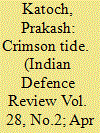

|
|
|
| 5 |
ID:
118107


|
|
|
| 6 |
ID:
124628
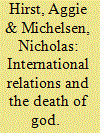

|
|
|
|
|
| Publication |
2013.
|
| Summary/Abstract |
Friedrich Nietzsche's proclamation of the 'Death of God' has come to function as something akin to a heuristic device in International Relations (IR) signifying the shattering of metaphysical and ontological certainty in European (post)modernity. According to Chris Brown, Nietzsche's declaration is commonly believed to signify a 'crisis in thought' which constitutes a 'genuine danger' insofar as it risks 'the collapse of the foundations of the old world order'.1 Roland Bleiker notes that such a crisis is deemed by many to be symptomatic of the loss 'of a generally accepted worldview that provided a stable ground from which it was possible to assess nature, knowledge, common values, truth, politics - in short, life itself'.2 This forum seeks to interrogate the substance and consequences of the claim that 'God is Dead' in the context of global politics, and specifically its implications for IR theory, contemporary political violence, and questions of ethics and responsibility.3 Before providing an overview of the points of synergy, agonism and divergence in the papers, this introduction will offer some contextualising remarks relating to the metaphysical, conceptual and historical parameters of the 'Death of God', marking its emergence in European political thought and provisionally mapping the terrain of its pertinence to contemporary IR.
|
|
|
|
|
|
|
|
|
|
|
|
|
|
|
|
| 7 |
ID:
137571
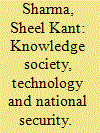

|
|
|
| 8 |
ID:
140752
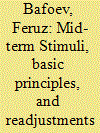

|
|
|
|
|
| Summary/Abstract |
The United States is kept busy by the events unfolding worldwide and on the Eurasian continent (the Ukrainian crisis, Afghanistan, the anti-Russian sanctions, oil and gas prices, the Muhammad cartoons crisis, the Lausanne talks on the Iranian nuclear file, etc.). Under the pressure of these and many other factors, Washington is actively readjusting its Central Asian policy, as well as its conceptual approaches to the regional policies of other players and to the changing specifics of each of the Central Asian countries.
|
|
|
|
|
|
|
|
|
|
|
|
|
|
|
|
| 9 |
ID:
137762
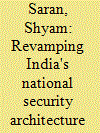

|
|
|
| 10 |
ID:
118930
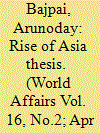

|
|
|